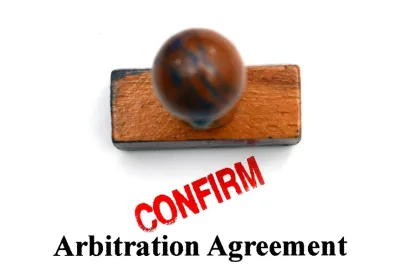When a claimant who is party to an arbitration agreement initiates litigation of arbitrable claims, the defendant in that case typically expects to be able to move successfully to compel arbitration under the Federal Arbitration Act (“FAA”), 9 U.S.C. § 4. In cases where the litigation is commenced in a federal district court whose geographical jurisdiction includes the agreed place or “situs” of arbitration, that expectation is likely valid. However, if the litigation is commenced in a district other than one in which the parties agreed to arbitrate their disputes, the federal court may not only be unable to enforce the contractual provision regarding the “place” of arbitration, but it may be unable to compel arbitration altogether. The courts are divided on the issue.
Venue is a factor that haunts a motion to compel arbitration because of the terms of Section 4 of the FAA. Section 4 provides that “[a] party aggrieved by the alleged failure, neglect, or refusal of another to arbitrate under a written agreement for arbitration may petition any United States district court . . . for an order directing that such arbitration proceed in the manner provided for in such agreement.” If the court is satisfied, before or after trial, that there is an arbitration agreement and that a party failed to comply with it, “the court shall make an order directing the parties to proceed to arbitration in accordance with the terms of the agreement.” However, Section 4 also provides that “the hearing and proceedings under such [arbitration] agreement shall be within the district in which the petition for an order directing such arbitration is filed.” But what if the petition to compel arbitration is filed in a federal district that does not include the contractually agreed place of arbitration? The courts are split in that regard.
Majority View
The majority of federal courts have construed Section 4’s language strictly, and have held that a district court cannot compel an arbitration to proceed outside of its geographic jurisdiction. For example, in Ansari v. Qwest Communications Corp., the Tenth Circuit affirmed a Colorado federal district court’s denial of defendant’s petition to compel arbitration on the basis that the district court was unable, under Section 4, to compel arbitration in Washington, D.C., the place of arbitration specified in the parties’ agreement. 414 F.3d 1214, 1219-20 (10th Cir. 2005). The Tenth Circuit likewise affirmed the district court’s holding that it could not compel arbitration in Colorado because the parties’ arbitration agreement did not authorize it to do so. Id. at 1220 (“[The] majority view holds that where the parties agreed to arbitrate in a particular forum only a district court in that forum has authority to compel arbitration under § 4.”) (collecting cases).
The Third, Sixth, and Seventh Circuits have also endorsed this view. See Econo-Car Int’l v. Antilles Car Rentals, 499 F.2d 1391, 1394 (3d Cir. 1974); Inland Bulk Transfer Co. v. Cummins Engine Co., 323 F.3d 1007, 1018 (6th Cir. 2003); Merrill Lynch, Pierce, Fenner & Smith v. Lauer, 49 F.3d 323, 328 (7th Cir. 1995) (district court lacks authority to compel arbitration in other districts, or in its own district if another has been specified for arbitration).
The majority of district courts that considered the issue also hewed to the Tenth Circuit’s reading of FAA § 4. See, e.g., Dempsey v. George S. May Int’l, 933 F. Supp. 72, 75-76 (D. Mass. 1996); J.P. Morgan Sec. v. La. Citizens Prop. Ins. Corp., 712 F. Supp. 2d 70, 82-83 (S.D.N.Y. 2010), United States ex rel. TGK Enters. v. Clayco, Inc., 978 F. Supp. 2d 540, 551-52 (E.D.N.C. 2013) (holding that, under Fourth Circuit authority, the district court must stay litigation of arbitrable claims but cannot compel arbitration outside of its district); Nat’l Indem. Co. v. Transatlantic Reinsurance Co., 13 F. Supp. 3d 992, 1001-02 (D. Neb. 2014).
Minority Views
The Ninth Circuit has made a somewhat different construction of Section 4, however, holding that the FAA does not require that the venue of a motion to compel be filed in the contractually-designated place of arbitration. Textile Unlimited, Inc. v. A..Bmhand Co., 240 F.3d 781, 783 (9th Cir. 2001) (Section 4 venue provisions are discretionary, not mandatory, and “only confine[] the arbitration to the district in which the petition to compel is filed.”), citing Continental Grain Co. v. Dant & Russell, 118 F.2d 967, 969 (9th Cir. 1941) (affirming district court order compelling arbitration in Oregon despite the parties’ contractual designation of New York as place of arbitration).
Finally, the Fifth Circuit has taken a more liberal position, holding that a district court may compel arbitration in the place specified in an arbitration agreement even if that locale is outside the court’s geographical district. See Dupuy-Busching Gen. Agency, Inc. v. Ambassador Ins. Co., 524 F.2d 1275, 1276, 1279 (5th Cir. 1975) (recognizing Mississippi district court’s order directing parties to proceed with arbitration in New Jersey was contrary to express terms of FAA § 4, but finding district court acted correctly where plaintiff sought to avoid arbitration by bringing suit in Mississippi, rather than in the contractually agreed place of New Jersey, and defendant sought arbitration under terms of agreement). Dupuy-Busching remains good law as well in the Eleventh Circuit, which was subsequently split off from the Fifth Circuit. See Kong v. Allied Prof. Ins. Co., 750 F.3d 1295 (11th Cir. 2014) (affirming order compelling parties to arbitrate dispute in California).
Practice Tip
So what is a defendant to do when it prefers arbitration and has agreed with a counter-party to a place of arbitration, but the counter-party commences litigation elsewhere? If the litigation is not in the Fifth or Eleventh Circuits, the defendant should first move the district court to transfer venue under 28 U.S.C. § 1404(a), and follow that with a motion [in the transferee court] to stay or dismiss the suit while compelling arbitration. Hodosh, Lyon & Hammer, Ltd. v. Barracuda Networks, Inc., 2016 U.S. Lexis 23263, at *9-10 (D.R.I. Jan. 4, 2016), citing Atl. Marine Constr. Co. v. United States Dist. Court W.D. Tex., 134 S. Ct. 568, 575 (2013). See also Am. Int’l Specialty Lines Ins. Co. v. A.T. Massey Coal Co., 628 F. Supp. 2d 674, 685 (E.D. Va. 2009). Or the defendant might seek a stay of the suit while it moves to compel arbitration under FAA Section 4 in a federal district court with jurisdiction in the agreed place of arbitration.




 />i
/>i
